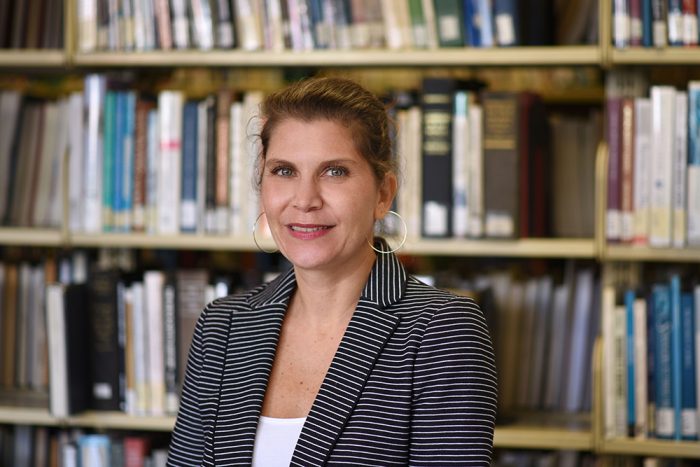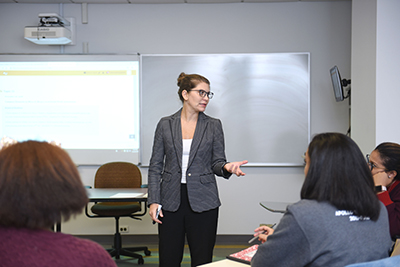How can women who face gender-based violence create conditions of safety and well-being in their lives? That is the question that animates the research efforts of Stavroula Kyriakakis, Ph.D., associate professor in the Adelphi University School of Social Work.

How can women who face gender-based violence create conditions of safety and well-being in their lives?
That is the question that animates the research efforts of Stavroula Kyriakakis, Ph.D., associate professor in the Adelphi University School of Social Work.
The director of a domestic violence program in New York City before pursuing her Ph.D., Dr. Kyriakakis focuses her research on intimate partner violence in communities and cultures where psychological counseling and other mental health services are stigmatized. Her goal is to provide evidence that can be used to design interventions and programs that address violence against women in communities where formalized counseling services are lacking.
Over the past five years, Dr. Kyriakakis’ research has taken her to Barbados, where she is working with the nongovernmental organization (NGO) Jabez House to learn more about women engaged in transactional sex work there and how to help them. These women, who are perhaps the most stigmatized and disempowered groups on the island, face constant threats of abuse and violence.
“Solving social problems of this magnitude is a daunting task,” she said, “but the first step as a social work researcher is to directly engage with members of the community to hear their stories.”
 Through her many interviews with transactional sex workers in Barbados, including those conducted last summer, Dr. Kryriakakis learned that these marginalized women feel trapped in sex work despite wanting to leave it. She saw that many of the women who were victims of domestic violence dropped out of school, grew up in poverty and left unstable homes. For most, their work was the only way to meet their basic needs.
Through her many interviews with transactional sex workers in Barbados, including those conducted last summer, Dr. Kryriakakis learned that these marginalized women feel trapped in sex work despite wanting to leave it. She saw that many of the women who were victims of domestic violence dropped out of school, grew up in poverty and left unstable homes. For most, their work was the only way to meet their basic needs.
She found that 60 percent of the women she interviewed experienced work-related violence. Many cope through prayer, sometimes beseeching deceased relatives for protection. Others use alcohol to cope or resort to isolation in order to regain some control over their lives.
Dr. Kyriakakis also found that transactional sex workers face almost insurmountable barriers to quitting and finding other work. Her research shows these women carry a lasting stigma and are ostracized, unable to find even the most menial jobs.
Dr. Kyriakakis’ work is leading to concrete steps to help these women. Jabez House has developed a job readiness program with employers willing to hire former transactional sex workers. And Dr. Kyriakakis’ findings that the women lack adequate access to health services, counseling and parenting classes has inspired Jabez House to begin creating relationships with local mental health providers who are understanding and nonjudgmental.
The research conducted in Barbados can have an impact on vulnerable communities far beyond the island’s shores.
“I want to understand how women exercise their power when they’re vulnerable,” she said. “The lessons I’ve learned apply everywhere. Companies can use this knowledge to design interventions to empower potential victims to prevent or stop workplace abuse.”
Her findings are also a foundation of the courses she teaches at Adelphi.
“I always ask my students what these women can teach us about safety and boundaries in the workplace,” she explained. “Insights from research conducted in marginalized communities can help social workers develop ways to empower vulnerable individuals and groups everywhere and enable them to live full lives, free from violence.”
For further information, please contact:
Todd Wilson
Strategic Communications Director
p – 516.237.8634
e – twilson@adelphi.edu